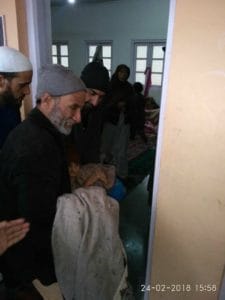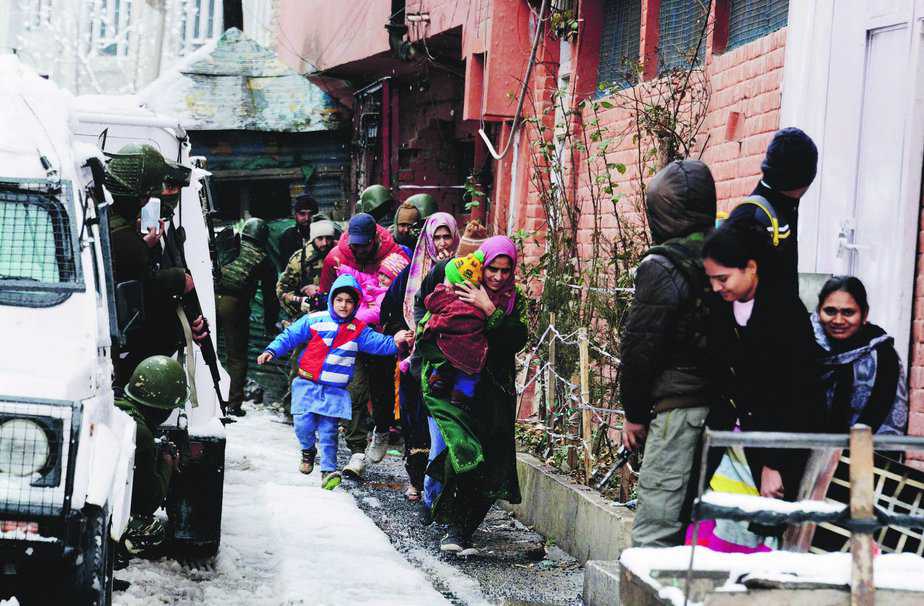People living in remote villages close to the LoC in Uri sector had to leave their homes following the worst exchange of artillery fire in 15 years since the 2003 ceasefire
At 8.15 am on February 22, Lal Hussain, 30, a resident of Charunda, one of the last villages along the Line of Control (LoC) in the Uri sector, was having tea at home when shelling started from the Pakistan side of the border. As the shells exploded at a short distance from his home, his family members gathered in a small room. Terrified, they closed the windows and doors, praying that their home would
be spared.
Hussain managed to leave home with his family only after 4.pm, when there was a pause in the shelling. He later took refuge in a temporary shelter in Uri town, where hundreds of affected families from other border villages have been given shelter by the local administration in a government higher secondary school.
“It’s the sixth day after we left everything behind, including our cattle,” says Hussain, who is staying with his family in the temporary shelter in the Uri town. He said the latest shelling is the worst they’ve seen since the 2003 ceasefire on the India-Pakistan border.
“The local administration is asking us to go back now since there’s a pause in shelling but we are afraid as shelling can start any time,” he says, adding that their demand is that they should be rehabilitated elsewhere as the local administration can’t assure them that there will be no shelling once they return. “We can’t put our lives at risk again.”

Situated on a hilly, mountainous terrain about 110 km north of Srinagar, Charunda village has a population of about 1,300 people. Most of the inhabitants work as labourers. There’s a barbed wired border fencing wall that cuts through the village and on which Indian and Pakistani army posts keep a strict vigil. Troops from both sides maintain eyeball-to-eyeball vigil on each other’s posts.
Local villagers of Charunda said the Indian military camp in the village closes its gate, which is at the entrance of the village, at 6 pm every day, after which villagers are not allowed to move in and out. “When we have a health emergency or some delivery case here, we can’t take them to the nearest hospital,” says Hussain. “We have to wait till next morning when the gate is reopened and then only we can move out.”
Hussain is worried about children from his family whose schools are set to reopen after the winter break. “If the shelling continues like this, we are not sure if they can attend school,” he says, adding that kids are already terrified by the shelling. “Even if they go to schools in this climate, we will be more worried about their safety now.”
Hussain believes the border village residents like them can live in peace only when India and Pakistan come to the table and engage in talks to resolve the Kashmir issue. “We request the state and central government to talk,” he says, almost pleading. “Hatyar, golay bari say koye masla hal nahe hoga. Dono mulk baeth kar baet cheet karnay chaheyay. (Nothing can be resolved by weapons or shelling. The two countries should sit together and talk to resolve their issues.)”
Since January 22, heavy shelling along the LoC has displaced thousands of residents of Silkote, Mothal, Hathlanga, Soura, Churanda and Tillawari, the worst affected villages in the Uri sector. In Silikote and Churanda villages five residential houses were damaged in the recent shelling. After the 2003 ceasefire agreement between the two nations, the affected residents said the latest shelling is the worst they’ve witnessed in 15 years in this sector.
“There was some respite on Saturday night and we were able to shift 30-40 more families from the affected villages to a safer location in the main town,” said D Sagar Doifode, Sub divisional magistrate (SDM) Uri. He said more than 1,500 people from the affected villages were shifted to a temporary camp in Uri town and more families from the affected villages continue to be shifted to safer locations.
Residents of Silikote, which is one of the last few villages close to the LoC in Uri, from where Pakistani military posts can be seen from a distance, had to leave behind their homes and cattle and take shelter with their families in the main town after announcements were made on loudspeakers on Saturday morning from the Pakistan side, asking the residents to leave their homes before the shelling began.
“On Saturday the shells also landed in residential areas in our village burning three houses and some cattle also died,” said Farooq Ahmed, a resident of Silikote village who had come back to check on his house on the following Sunday morning after the shelling stopped overnight. Helped by the local administration, Farooq had left the village along with his family and other residents of the village after the shelling began. His family continues to stay in the temporary shelter setup in Uri town. Most of the houses in his village are locked up. Some of the residents are staying at the homes of their relatives and other people elsewhere in the town.
“We are the worst sufferers here whenever the two sides fire on each other’s posts as many shells end up hitting our homes and cattle here,” says Farooq, who wants the two nations to resolve the Kashmir issue through talks. “Only then can we live in peace here.”
Tanveer Chalko from Silikote village, a graduate student in his early twenties, said hostile relations between India and Pakistan has a direct bearing on their lives in the border villages. “The last time there was such shelling in our village in 2003, my cousin lost both his legs after a shell exploded outside his home,” he said. “And a year later his mother died after she was hit by a burst of fire which came from the other side when she had gone out to graze her cattle.”
“The two sides should decide what they are going to do, and if they continue shelling like this here, then we should be relocated permanently to some other place where we can live in peace,” says Chalko. “This way our life is becoming hell.”
There’s also lack of adequate infrastructure, medical facilities, and proper roads and shelters to protect them from cross border shelling in these villages along the LoC. The villagers said the shells fired from the Pakistan side in the past have landed on their homes, blown off rooftops, and injured and killed local people and their livestock.
The latest shelling has brought back painful memories of the past for the local residents of these border villages. Gulzar Ahmed Mir, a middle-aged resident of Tilawari village, another affected village close to the LoC in Uri, said the last time shells landed in their village was before 2003. Like other people, Mir had also come back to check on his house on Saturday morning after the shelling stopped overnight for some hours. His family is still staying in a temporary shelter in Uri town. They are afraid to return as two houses in his village have been damaged in the shelling so far.
“After the shelling began, about 70 families in our village had to move to safer locations in Uri town with the help of local administration,” he says, adding that they are trapped in this situation and have nowhere to go till they eventually return to their homes.
Fed up living in the line of fire for decades, Mir wants the two sides to declare a ceasefire so that they can live in peace. “What do the two countries achieve by this shelling which ends up bringing more miseries for the people living close to the border on both sides?” asks Mir, who wants the two nations to resume talks and resolve the Kashmir issue.
“For god’s sake we have suffered enough now,” he says in an exasperated tone. “The two nations should talk to each other and allow us to live in peace right here.”





